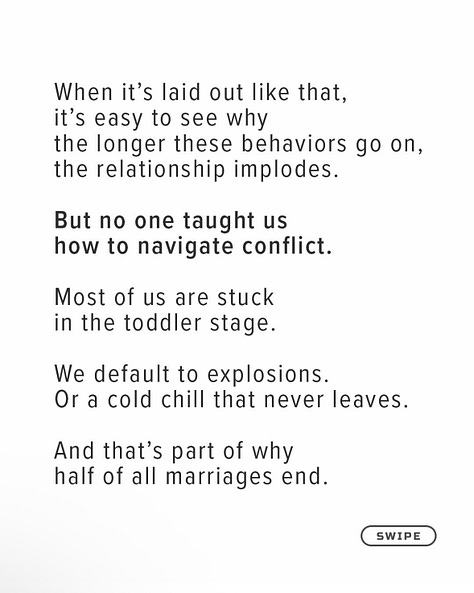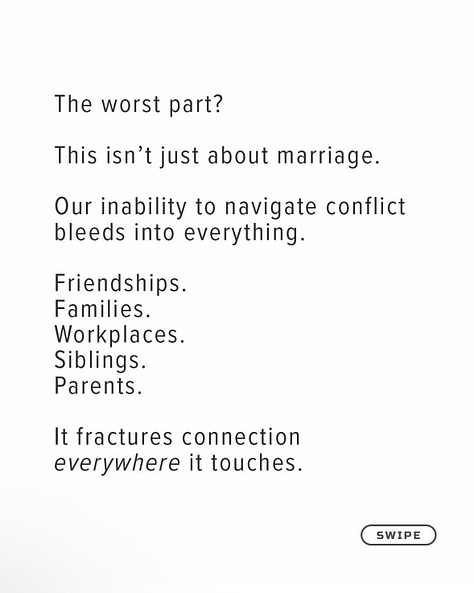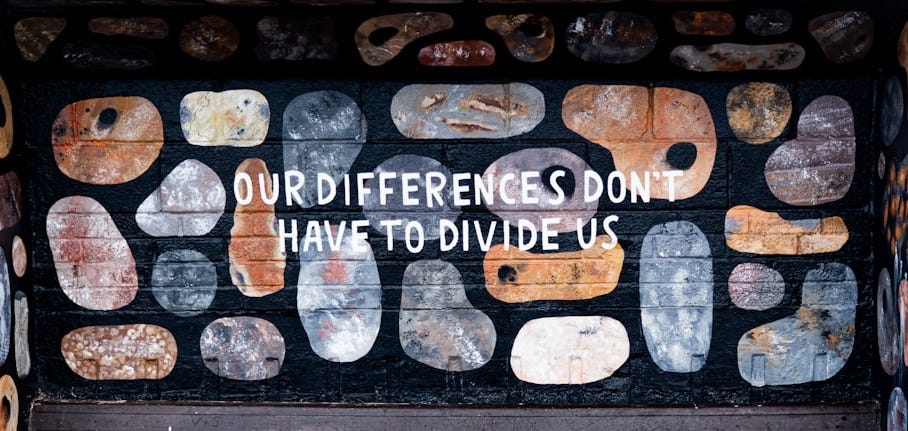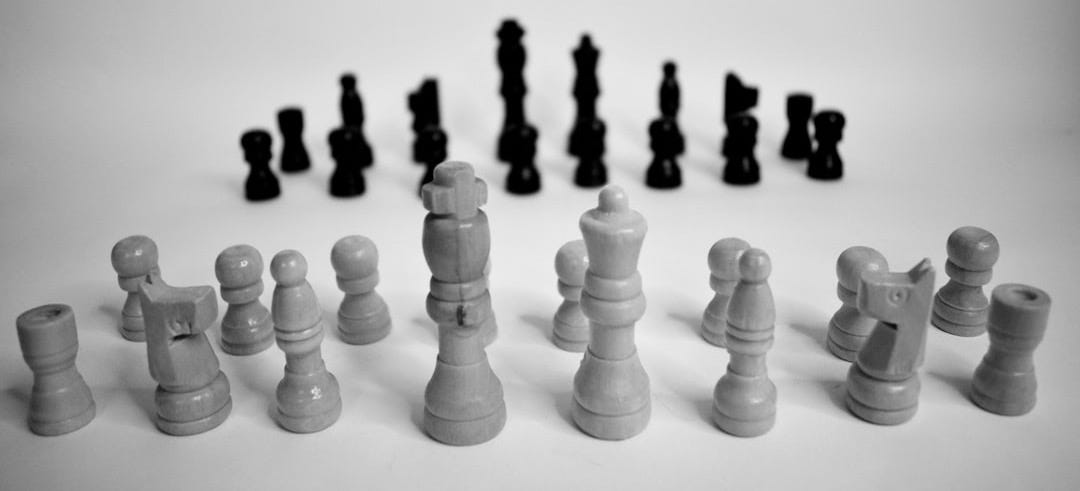The Sacred Art of Conflict Resolution
Learning to navigate conflict with clarity, compassion, and emotional maturity.

Conflict.
Something nobody enjoys, most people avoid, and yet, something that’s incredibly necessary to experience and practice.
And I’m using the word practice intentionally because I’ve realized healthy conflict isn’t something you just wake up knowing how to do. It’s learned. It’s lived. It’s practiced.
Recently, I had an eye-opening experience where I handled conflict resolution successfully for the first time in my almost 27 years of life. And I wanted to talk about it a bit because what I saw in that moment feels like a root issue not just in my own life but in a lot of people’s.
I’ve always known conflict made me uncomfortable. I was the kid who couldn’t speak up, so instead I’d slide notes under the door or hide in my room.
Conflict growing up either looked like silence, waiting for things to magically resolve, or loud, scary, and sometimes painful outbursts that left me shutting down and disappearing✌🏾.
As a recovering people pleaser, I knew working through this was inevitable, especially if I wanted to keep and nurture real relationships. At first, I was mostly focused on creating strong boundaries and standing ten toes down on them. Eventually, I realized I’d gone from one extreme to the other.
I wasn’t actually handling conflict. I was just avoiding it differently.
Avoiding conflict doesn’t help you hold onto the people you love. In fact, it became a quiet way I was pushing people away while telling myself I was protecting my peace.
Throughout school, I gained and lost a lot of friends. The hardest part? I didn’t always understand why. I didn’t get closure. I didn’t get the conversations. And deep down, it didn’t make me angry—it just hurt. I wondered, was it something I could’ve fixed if someone had just told me? Or were these friendships never real to begin with?
Even that sentence shows how my brain still leans toward black-and-white thinking. But I remember the sting of it clearly, especially when two of my closest friends just stopped speaking to me. One blocked me on everything. The other told me I wasn’t a good friend. No real conversation. No unpacking. Just silence. And that silence echoed through me for years.
I know now that during that time, I was struggling. I was in a depression. I wasn’t fully present. I was consumed by a toxic relationship and barely holding onto myself—so no, I probably wasn’t the best friend. But I never got the chance to be better. To explain. To evolve. And that is what still lingers. Because I know if I had been given that time and grace, I would’ve at least tried.
And here’s the part that hit me recently: I’ve started doing the same thing to others.
Funny enough, a few of those old friends circled back like nothing happened. And I let it happen, for a bit. Until one day, I thought, “You told me I wasn’t a good friend… so what’s changed?” We still never had a conversation; it was like I was just expected to be grateful that they were talking to me again, but that’s not how I felt. Eventually, I returned the favor. Block. Move on. And I’ve done that a lot since.
It’s not that I don’t feel guilty about it. I just recognize that I swung to the defensive side. Whenever I felt slighted, dismissed, or ignored—when I didn’t get the honesty, the apology, or the accountability I thought I deserved—I’d block and move on. Find new people. Keep it pushing. I know it sounds bad. But this is what shadow work looks like, the good and the bad.
And I think it’s the fact that sometimes, I don’t know how guilty I should feel about this. With the friends I’ve made since then, I have tried to have those conversations. Sometimes I’d voice my concerns multiple times. And still, I’d be met with deflection, secrecy, or silence. So, eventually, I’d get tired of waiting. Blocked.
The moment that really cracked things open for me was the conflict I recently had with my sister, the one I mentioned in my Chiron post.
I hadn’t prepared her to see herself being written about publicly, and it led to a much-needed confrontation. Thankfully, we talked about every topic we’ve ever tiptoed around, beginning to end. It was tense. It was awkward at first. But in the end, it felt like relief. It felt like resolution. It felt like healing.
And it reminded me: conflict doesn’t have to break people. Sometimes, it’s the exact thing that brings them closer. I was prepared for our gap to grow wider. But instead, we recognized our patterns. We understood where they came from. And we chose to move forward, together.
And one thing I will say, she led the way with this one! I’ve always admired her ability to handle conflict within her personal life, and I’m grateful that she gave me the opportunity to grow and learn how to do the same. My heart was palpitating the entire first hour. But by the end, I just felt grateful. I felt proud. I felt like I’d done something I never knew how to do before—stay, and work it through.
I wasn’t sure if I was going to write about this. But then I saw a post on Instagram by @mightypursuit about marriage and conflict, referencing a study by Dr. John Gottman that started back in 1986. It found that you can predict with 93.6% accuracy whether a couple will eventually divorce, based on the presence of these four behaviors:
Criticism: “You’re the problem. I don’t accept you as you are.”
Defensiveness: “I won’t take responsibility. I care more about being right than being close.”
Contempt: “I think I’m better than you. I’ve stopped respecting you.”
Stonewalling: “You don’t matter enough for me to stay in this moment with you.”
The study found that these patterns either lead to explosive, early endings or quiet misery that eventually freezes the relationship to death.
“The relationship didn’t combust. It just chilled over. Until the cold became permanent. This second group stays for years in quiet misery. Eventually divorcing (on average) after year 16.”
And I realized… a lot of us were never taught or shown how to properly resolve conflict. We were taught to explode. To run. To shut down. To manipulate. To ghost. To lie. To avoid. To preserve ourselves, even if it meant never really knowing each other.
But that doesn’t serve us anymore.
It doesn’t grow empathy.
It doesn’t deepen understanding.
And it definitely doesn’t bring people closer—whether in love, friendship, or family.



Some people need to hear this: yes, your feelings matter. But so do theirs. Yes, it’s hard to speak up. And yes, it’s hard to hear tough truths. But real growth happens in that discomfort. It’s not about exploding or disappearing. It’s about staying in the room. Not to win. Not to be right. But to understand. To repair. To care.
Ask yourself: Why do you run when it matters most? Why do you replace people instead of trying to rebuild? Why do you explode or shrink, instead of choosing to just pause and think?
Conflict doesn’t have to be chaos. It can be a sacred practice. A ritual of honesty. A portal to a deeper connection. It just takes willingness, self-awareness, and a whole lot of breathwork.
The point is to tag team the issue, not each other. Listen to understand, not just to respond and defend. Even when you’re in the right, but more specifically when you might be in the wrong. Being wrong doesn’t mean you’re a terrible person; it means there’s room to grow and an opportunity to heal an important connection in your life. If anything, conflict is an opportunity.
So the question becomes:
What can we do to handle conflict better?
Well, I’ve learned a few key things to keep in mind when it comes to conflict:
Most people approach conflict through the lens of their own experiences. It’s not just about what’s happening in the moment — it’s often shaped by past wounds, assumptions, fears, and personal beliefs. What feels like a disagreement on the surface can actually be rooted in much deeper emotional layers.
When emotions run high, it becomes even harder to navigate conflict clearly. If someone struggles to manage their feelings under stress, they might react defensively or shut down, which only adds to the tension. That’s why emotional awareness is such a key part of resolving conflict.
Avoiding the issue doesn’t make it disappear. Unresolved conflict tends to sit beneath the surface, building pressure over time. It creates emotional distance, and eventually, it becomes harder to reconnect or repair.
In any healthy relationship, both people’s needs matter. It’s important to approach those needs with mutual respect and a willingness to understand where the other person is coming from.
When both sides are open to exploring their differences with patience and empathy, conflict can actually become a major turning point! It can open the door to creative solutions, clearer communication, and a more trusting and resilient connection.

Stress management is incredibly important.
When you’re overwhelmed by your emotions, it’s not the right time to try and resolve anything. You’re more likely to misread someone’s body language, misunderstand their feelings, or twist the meaning of their words. It also becomes harder to see past your own anger and focus on resolution rather than trying to “win” or feel in control.
In that state, you may struggle to clearly communicate your own needs or connect with the deeper issues beneath the surface. That’s why it’s important to ground yourself. Breathe. Ask for space and take the time you need to regulate before stepping into the conversation.
Emotional awareness matters too.
Check in with yourself about how you're feeling and why. That self-understanding helps you enter a conversation calmly and with the intention of actually solving the problem, not just reacting to it.
Although knowing your own feelings may sound simple, many people ignore or try to sedate strong emotions like anger, sadness, and fear. Your ability to handle conflict, however, depends on being connected to these feelings. If you’re afraid of strong emotions or if you insist on finding solutions that are strictly rational, your ability to face and resolve differences will be limited.
Lastly, body language plays a HUGE role in how conflict is communicated and received.
As an empath, I notice it in others almost immediately—but I’ve realized I often forget to be mindful of the energy I’m putting out myself. The truth is, it’s hard for someone to believe what you’re saying when your body language tells a different story. And you don’t have to be an empath to pick up on that kind of disconnect.
Paying attention to nonverbal cues, like facial expressions, posture, gestures, and tone of voice, can help you understand what someone is really feeling beyond their words. The more in tune you are with your own emotions, the easier it becomes to recognize those unspoken signals in others.
It’s also important to consider what you might be communicating nonverbally during conflict. Ask yourself if your body language matches your words. You might say, “I’m fine,” but are you really?
If you’re grimacing, avoiding eye contact, narrowing your eyes, sighing frequently, or laughing things off when someone is trying to have a serious conversation, your body is clearly telling a different story. While context matters and you can’t rely on body language alone to assume what someone thinks or feels, it definitely adds to the overall message being communicated.
Nonverbal cues like a calm tone of voice, relaxed posture, or a simple nod of understanding can help ease tension and keep the conversation productive. These small signals often speak louder than words, especially in emotionally charged moments.
It’s also important to be mindful of interrupting. Let the other person finish their thoughts. If you want respect, you have to offer it in return.
At the end of the day, conflict is a part of life. It’s not something to fear or avoid, but something to learn from.
Learning how to navigate it with care has been one of the most healing and humbling lessons of my life so far. It’s taught me that tension doesn’t have to mean the end of a relationship—sometimes, it’s the beginning of a deeper one. We’re all going to mess up. We’re all going to miscommunicate. But what matters is how we choose to respond, repair, and reconnect.
Conflict handled with compassion can become a doorway to trust, understanding, and growth. And the more we lean into that discomfort with presence and intention, the more we open ourselves to relationships that are real, resilient, and worth keeping.
Thank you so much for reading The Divine Vitality!
If my stories, readings, and reflections bring value to your journey, inspire, or guide you, I would be truly grateful if you’d consider supporting me. You can become a paid subscriber, book an affordable tarot reading to help me practice and grow, or even offer a small contribution via my tip jar.
My heart for this blog has always been to share love, light, and healing openly, and I deeply desire that everyone who visits here finds something meaningful. At the same time, your support empowers me to keep creating, sharing, and learning as I pursue this as my career. Every bit of encouragement and support is a blessing, and I’m endlessly grateful to each of you for helping make this journey possible.
Thank you for being here💛




https://open.substack.com/pub/egretlane/p/inspiration-to-end-your-week-friday-89c?r=5ezmlv&utm_medium=ios
🙌🏾🙌🏾💛💛